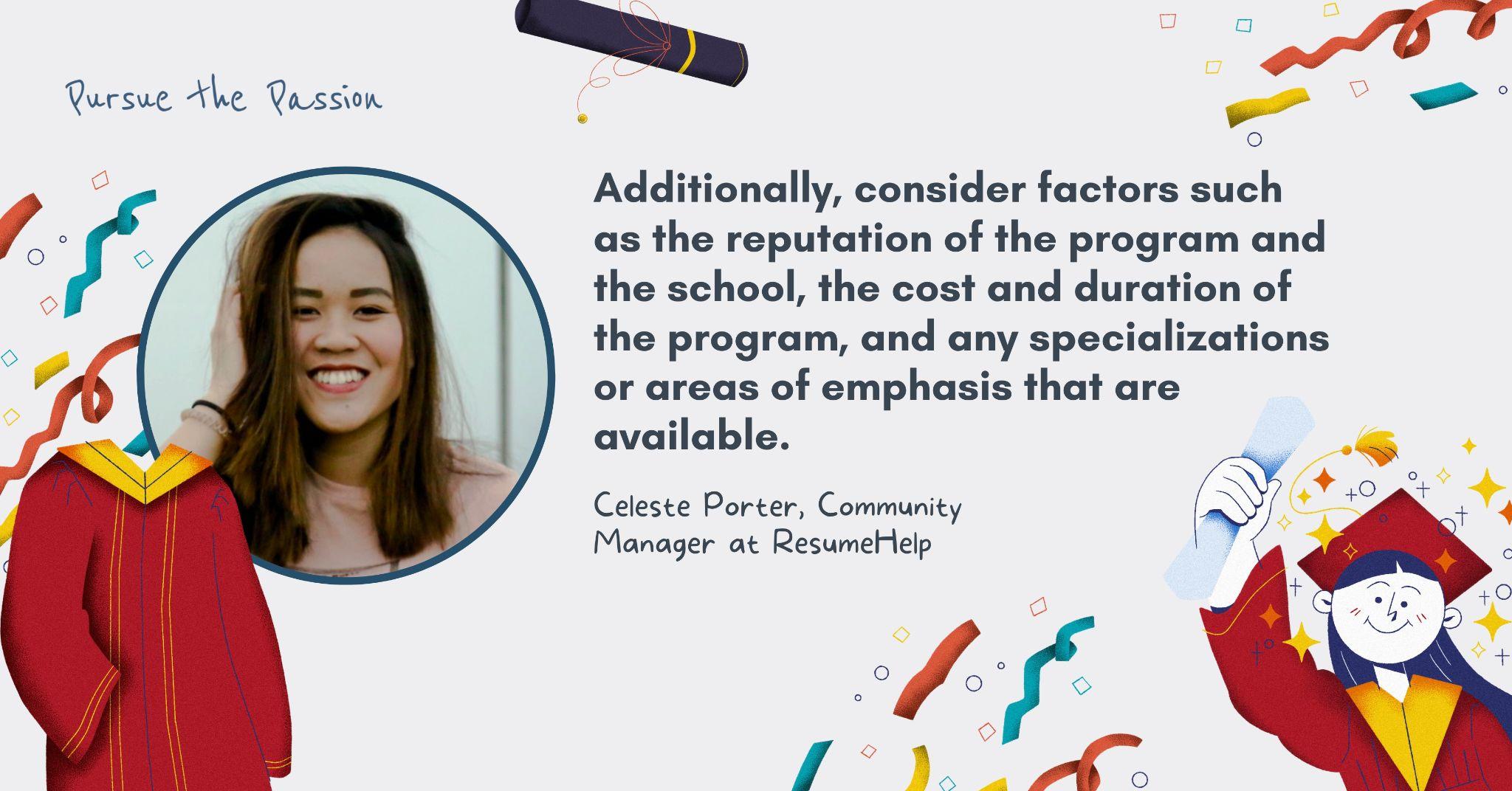What Masters Degree should I get?
From analyzing essential resources to choosing a good university, here are nine answers to the question, “What are the best ways someone could determine which masters degree to work toward?”
- Analyze the Necessary Resources
- Get Hired in the Career Track First
- Start With Passion, Choose With Practicality
- Define Your Career Goals
- Create Pros and Cons Lists
- Don’t Rush Your Decision
- Take a Chance on Something
- Pick a Program That Pays
- Not All Universities Are Equal, So Choose Wisely
Analyze the Necessary Resources
Master’s degrees, directly or indirectly, require some financial investment. It may not be a tuition fee but rather the commute to another city or the investment in materials needed to complete a certain piece of research or other important studies. The problem is investing in something that you can only afford to go some way, even with scholarships provided by universities and funding agencies.
Ricardo von Groll Manager, Talentify
Get Hired in the Career Track First
As a recruiter, for almost 20 years, I have commonly encountered people who acquired degrees in areas that they either didn’t like, or there wasn’t enough demand for, and find themselves having a hard time finding satisfying employment within their chosen master’s degree. So I would recommend securing a job within the field or career track of what you were looking for before acquiring a master’s degree. Doing this will help:1. Determine or confirm that it’s the field you actually want to work in. 2. Expose you to different opportunities to make sure that you get the most relevant master’s degree based on your desired career goal as well as the existing demand3. Uncover additional resources and assistance in getting your master’s, because there are several companies that will actually pay for a master’s degree if it’s within the track of the job that you’re already in.
Rollis Fontenot III Founder, HR Maximizer
Start With Passion, Choose With Practicality
The best method of choosing the right master’s degree is to first assess your current skill set, interests, and working style. Once you have identified these, you can then research the various career paths that are in demand and cater to your particular skill set and interests.
After researching the various options, you can then narrow down your choices to the specific degree that best fits your needs and goals. Additionally, you should also consider the potential salary and job opportunities that may be available with the degree you are considering.
Finally, you should also look into the potential for career advancement and the types of job opportunities that may be available after completing the degree.
Kate Duske Editor-in-Chief, Escape Room Data

Define Your Career Goals
One way to determine which master’s degree to pursue is to consider your career goals and the industries or fields that interest you. Research different master’s programs and their curricula to see which ones align with your interests and goals.
You can also talk to career counselors or professionals in your desired field to get their advice and insights on the best master’s degree for your career path. Additionally, consider factors such as the reputation of the program and the school, the cost and duration of the program, and any specializations or areas of emphasis that are available. By considering these factors, you can make an informed decision about which master’s degree is right for you.
Celeste Porter Community Manager, ResumeHelp

Create Pros and Cons Lists
Do you know those pros and cons lists you’ve made when trying to make a tough decision? Try using something similar to figure out which master’s degree is best for you. Find four to five choices that seem interesting and write a pros and cons list for each. But instead, make it a love-and-hate list. What do you think you would love about the career path that comes from that degree? What wouldn’t you like?Then, evaluate each list. Which one has a ton of “loves?” Which one is riddled with “hates?”That will make your decision easier (and assist in basing it on what you enjoy doing) and create a long-lasting career path.
Kelli Anderson Career Coach, Resume Seed
Don’t Rush Your Decision
It is especially important if you have no idea which master’s degree to get. There’s nothing wrong with feeling like that. After all, it may turn out to be the most important decision for your future career.
Also, don’t let others put pressure on you. Give yourself a chance to think carefully about your strengths and weaknesses, long-term professional plans, as well as pros and cons of various master’s degree programs.It is likely that you have just completed your undergraduate work. You might even need a break before starting another academic challenge then. In this situation, taking a step back for perspective may be greatly beneficial for you.
Though many people believe that coming back to university after a gap year is difficult, I disagree with it. I have done it twice and regret nothing. This time allowed me to gain some precious work and life experience and make a more informed decision when it came to my master’s degree choice.
Agata Szczepanek Community Manager, LiveCareer
Take a Chance on Something
You should go into a master’s program that you feel you would enjoy and do well in. I took this advice from someone who started her graduate work in an MBA Program, and after one semester she wanted out!
Her boss at the time, who was the President of the University she was working for, told her that she could not do graduate work and strongly suggested she look into other programs.
She did just that and entered the Counseling Psychology Master’s Program. It took some time but she soon enough loved it! To this day, she is happy to have her graduate degree in something she enjoys and still studies. Sometimes you’re too young to realize a passion until you give it a shot!
Kristina Ramos Reverse Recruiter, Find My Profession
Pick a Program That Pays
This is an investment in your financial future, so make sure you pick a program that has a clear path to making back your upfront investment. This is crucial and often overlooked.
Start by researching the career prospects with each degree and calculate potential salary increases for holders of a master’s level education. This will give you an idea of how much value each degree may have in terms of earning potential.
Then look at the curriculum and classes offered, as well as internship opportunities, to make sure you are getting the best quality education available.
Yusuf Shurbaji Co-Founder & Managing Partner, Prismfly
Not All Universities Are Equal, So Choose Wisely
It’s important to understand that not all universities are equal. Each university has its own strengths and weaknesses, so it’s important to do research into what the various institutions offer.
Many universities also have specialized programs in certain fields of study that may not be available at other schools. Additionally, you’ll want to consider what type of work you would like to pursue after graduation and which degree program best meets those needs.
Prestige is not always the most important metric to consider when selecting the right university. Pick the one with the best program tailored to your specific needs and aspirations.
Submit Your Answer
Would you like to submit an alternate answer to the question, What is one way someone could determine which masters degree they should get?






